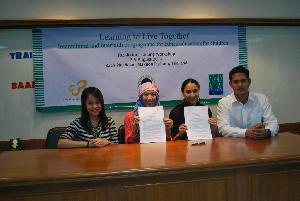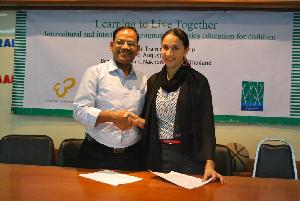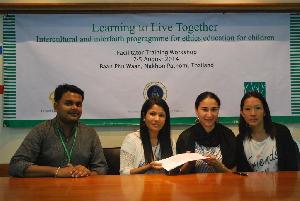
From 2 – 5 August, the first South East Asia Regional workshop on the Learning to Live Together Programme was held in Bangkok for 25 participants from Bhutan, Indonesia, Japan, Laos, Myanmar, the Philippines and Thailand.
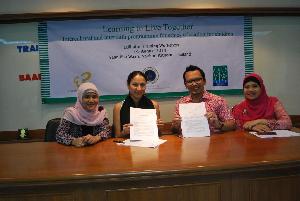 The South East Asia Regional workshop was held in Bangkok in collaboration with the Institute of Human Rights and Peace Studies of Mahidol University. The objectives of the workshop were to introduce the participants to the educational framework and approach of the Learning to Live Together Programme, develop skills to conduct ethics education activities with children and youth, and design concrete plans to develop a systematic implementation back in their countries. The workshop was the first regional workshop in South East Asia and aimed to bring the Learning to Live Together to new locations and promote interfaith collaboration for violence prevention.
The South East Asia Regional workshop was held in Bangkok in collaboration with the Institute of Human Rights and Peace Studies of Mahidol University. The objectives of the workshop were to introduce the participants to the educational framework and approach of the Learning to Live Together Programme, develop skills to conduct ethics education activities with children and youth, and design concrete plans to develop a systematic implementation back in their countries. The workshop was the first regional workshop in South East Asia and aimed to bring the Learning to Live Together to new locations and promote interfaith collaboration for violence prevention.
On the second day of the workshop participants reflected, shared and discussed about their work with children, the ethics education approach, how we see children in our own religious traditions and how to nurture their spirituality. In the afternoon participants went through the learning modules of the manual, worked on the design of the programs they will be implementing after the workshop, and participated in activities to learn how to use the learning process with children and youth. They deepened their knowledge on methodologies and techniques and during the evening engaged in discussions in an Interfaith Cafe.
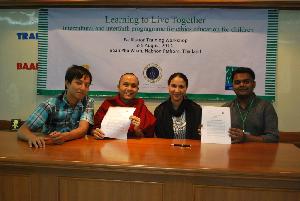 Cafe Methodology to initiate an interfaith dialogue about issues that affect children, ethics, values and spirituality. She explained that there are three types of interfaith dialogue: 1. Dialogue based on doctrine; 2. Dialogue based on practice and 3. Dialogue based on experiences of life where the topic is at the center. This last one was the focused of our interfaith cafe.
Cafe Methodology to initiate an interfaith dialogue about issues that affect children, ethics, values and spirituality. She explained that there are three types of interfaith dialogue: 1. Dialogue based on doctrine; 2. Dialogue based on practice and 3. Dialogue based on experiences of life where the topic is at the center. This last one was the focused of our interfaith cafe. 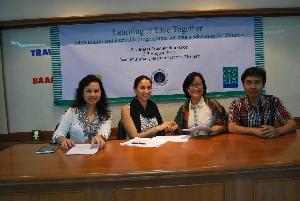 On the third day, the Online Platform for facilitators of the Learning to Live Together was presented to the participants. This was the first time that the platform was introduced. Ms Valerie De Pauw, E-learning Program Manager of Arigatou International, conducted an interactive session where participants created a profile on the platform, shared messages and learned how to use it to share resources and information about their projects.
On the third day, the Online Platform for facilitators of the Learning to Live Together was presented to the participants. This was the first time that the platform was introduced. Ms Valerie De Pauw, E-learning Program Manager of Arigatou International, conducted an interactive session where participants created a profile on the platform, shared messages and learned how to use it to share resources and information about their projects.
Throughout the workshop participants shared with one another the projects they are implementing in their organisations, shared their experiences and ideas and started to build a community of practice for the region. The workshop ended with clear commitments and action plans from the participants to implement the Learning to Live Together Programme in their organisations for specific periods of time.
New relationships were built and exciting initiatives in each country will start taking place in the next months. Special thanks to the Institute of Human Rights Rights and Peace Studies of Mahidol University and to all organisations and individuals that actively participated.
